Episodic Interview: Heartstopper's Alice Oseman on adapting—and expanding—their comic for Netflix
Insight into Imogen, Ben, Will and Elizabeth, and other changes to Nick and Charlie's journey as it moved to TV
As a recovering English major and current media scholar, I am heavily inclined to think about any “book turned TV show” through the lens of adaptation, but this is particularly true for Netflix’s Heartstopper for two main reasons.
First, there’s the subject matter: while queer identity has become an increasingly large part of YA writing, and has always thrived in spaces like Tumblr where Alice Oseman’s webcomic first developed a following, there still remains challenges in bringing those stories to life in mainstream film and television, particularly in programming aimed at younger audiences.
Second, and most important, is that Oseman themself was responsible for adapting the story. A first-time screenwriter, Oseman had the distinct opportunity to revisit the story they had told once before, reimagining the first two volumes of the story by balancing the needs of the narrative with the needs of a new medium.
Accordingly, as soon as I finished the season and started writing my episodic reviews, I immediately emailed Netflix to ask if it was possible to talk to Oseman about the experience of returning to this story, and I was able to wrangle 15 minutes of their time. This meant that I wasn’t able to start with my planned hour-long deep dive into Oseman’s philosophy of Teen TV as I had imagined, but we were able to explore their approach to expanding the story, its impact on Nick and Charlie’s journeys, the adjustments to characters like Ben, as well as the origins behind Nick’s movie night.
The conversation has been lightly edited for clarity.
Myles McNutt: You obviously know this story tremendously well, and so I’m curious how instinctual it was when you sat down to adapt it into a TV show—was there something you knew immediately that you would need or want to do in translating the show into a different medium?
Alice Oseman: The main thing was expanding the stories of the supporting characters, particularly Tao, Elle, Tara and Darcy. Because they and Nick and Charlie are like the “Main 6,” but in the comics there’s just not room to give them big storylines. They’re such beloved characters by the fans, like the fans just adore them, but honestly they don’t have a lot of page time. So the show was really the perfect opportunity to expand their stories and see a bit more of them than we do in the comics.
When I saw your Instagram post about casting the “Main 6” I remember thinking that I wouldn’t have considered them that way based solely on the books, but obviously within the fanbase these characters take on a larger life. With that in mind, which character’s story did you feel you needed to figure out first as you expanded their roles?
I think probably Elle, because of all of them I think we see the least of her in the comic, and yet she obviously has quite an eventful backstory. She’s moved schools, she’s transitioned, and there’s a story there. There was a lot to think about, like “what had happened.” That was so much fun, that was just the fun bit.
You’ve talked elsewhere about how adapting Heartstopper for television meant introducing more conflict, but that can be complicated when fans are so closely connected to these stories. When you announced the character of Imogen on Instagram, the comments were very concerned for what this meant for Nick’s story in particular, so I’m wondering how you approached balancing her role as a key driver of that conflict.
It’s so hard to balance between creating drama and keeping the tone of Heartstopper. In the comics, the stories are so low stakes—problems are resolved pretty much immediately, and I knew that that wasn’t going to work for TV, because that’s just not how TV shows work. So with Imogen, it was just balancing that fine line between getting the drama in there but not making it so melodramatic or putting in too many tropes that people would dislike—the goal was maintaining the message of Heartstopper which is everyone’s got their own story, and everyone’s working things out.
So with Imogen specifically, I always tried to treat her sympathetically, and even though she does cause some drama between the lead couple we also feel for her, because she’s just a girl who has a crush on her friend, and she doesn’t know what’s going on between Nick and Charlie. And particularly the last thing we see of Imogen really paints her in a sympathetic light and as a likable character.
Imogen’s arrival particularly delays Nick’s coming to terms with his bisexuality, which is a beloved story because of the general absence of bisexual representation, and the challenges of exploring bisexuality within a culture that often questions its validity. While the audience for the comic may be more predisposed to accept Nick’s identity, how did you approach telling that story to a much broader audience on Netflix?
It was important for me with Nick to go through a journey in his mind, figuring out what his feelings are and what his feelings have been. In the comics, one thing he is confused about when he starts having feelings for Charlie is that he knows he once had feelings for Tara when he was younger, and he’s unsure what that means for him and his identity. So we get to look at that in a bit more detail in the show, and we have a whole episode that’s quite heavily focused on Nick just thinking about what he’s feeling and talking to people about his confusion and going on the internet and doing research. It’s just about him figuring it out, and he doesn’t have feelings for Imogen, is what he realizes. But he has had feelings for girls before, so I think it’s important for him to look into his past because that’s what you would do in that situation. Hopefully, it was successful.
While you pull his Google searches directly from the book, you also add a new scene where Nick gets new perspective on his childhood obsession with Pirates of the Caribbean: Curse of the Black Pearl. How did you land on Elizabeth Swan and Will Turner as a moment of bisexual understanding?
When I was writing the show, I tweeted something along the lines of “To all the bisexuals out there, what is the most bisexual film in your opinion?” And SO many people said Pirates of the Caribbean. So, I was like right, that’s perfect. Nick realizes he has a crush on both leads, and that’s just a really cute, sweet, funny start to that episode and I think people are really going to love that scene.
Was it trouble getting the rights for that?
It was really hard, yeah, but I think it was worth it. We all really fought for that.

You mention Nick’s conversations with others, including Tara. One of the changes you make in bringing Tara and Darcy forward in the story is introducing them before they’re officially out to their classmates—what was your philosophy between bringing in the characters at this stage in their relationship?
In Volume 3 of the comics, there is a small scene where Tara is telling Charlie about how she sort of came out with Darcy, and became more comfortable calling herself a lesbian. We got a little snapshot of her journey, and I immediately knew I wanted to take that scene and see it in real time in the show and get that bit of Tara and Darcy backstory that we don’t really see live in the comics.
Tara being less comfortable with being out also draws clearer parallels with Nick’s journey: how did you feel this change reshaped their dynamic within the story?
Well in terms of Tara and Nick, I see them as being generally supportive—in the comics, though, it’s more Tara supporting Nick in his journey, but in the show we had the opportunity to do more with it, and they’re both sort of on this journey. They’re at different points in that journey, but I wanted to feel that kinship between them and so in the episode there is more focus on Tara and Darcy, and how both Tara and Nick are helping each other feel more comfortable in who they are. That sort of queer friendship is really, really important and something I’ve always loved writing.
Although these expanded roles mean there isn’t as much room to expand Charlie’s already significant story, you do adjust his story to focus more on the trauma of his past, and center some of the mental health struggles that become a bigger part of later volumes of the comic. What motivated that decision?
That’s something I wish I’d had room to include in the comics. Because Charlie’s trauma, the situation with the bullies, the situation with Ben—they’re traumatic events for him that do go on to influence his mental health issues later in the story. And one thing I really wanted to do in the show is just start to introduce those themes—not focus on them in this season, but just set them up.
Speaking of that trauma, both sources of Charlie’s trauma—Ben and Harry—come from the comics, but you seem to have adjusted your approach to Ben in particular. He still does terrible things, but he seems less vindictive, and we get more of a glimpse into why he might be doing them. What drove your decision to adjust Ben’s positioning in this story?
In the books, Ben is quite a 2-D villain. He’s just evil. And while we can sort of infer what his personal issues are, we don’t really learn anything about them in the comics. And I think the show was an opportunity to make him a more complex character and have a better understanding of what he’s dealing with without making him a sympathetic character, without excusing his actions.
And I’ve talked to a lot of people about Ben, and I’ve had some quite interesting reactions to his character. For example, people have said how important it is to see that kind of queer character who is dealing with kind of the same thing Nick is dealing with—internalized homophobia, being in a society with so much homophobia—but he’s going about it in the complete wrong way, and it’s turning him into a really horrible person. And that is a different sort of queer story, but it’s still a real queer story, and it’s still something that happens.
It’s been really interesting, and it’s something that I’ve worried about: it’s a big change from the comic, and I have been worried about what the reaction would be, but I think it’s a really good change.
You said in your instagram post about Isaac and Imogen that you’d love to expand on their characters in a second season—is the same true for this adjusted version of Ben?
I think so. I think there’s more to say. I would never want to venture into a redemption arc: that is inappropriate for the character and the story and the actions Ben has taken. But I think there is more to say about his part in Charlie’s story and his influence on Charlie’s mental health journey, and also the comparison between Ben and Nick, particularly as Nick is thinking about coming out and comparing that to how Ben feels about coming out, which obviously he has no intention of doing. So I think there’s a lot more to say.
I would love to discuss all of this—much of which I delved into in my own reviews—in more detail, plus get to characters like Tao, but since I’m out of time, a simpler question: is the plan to still take the “Main 6” to Paris should the show get a second season?
I would love to, for sure.




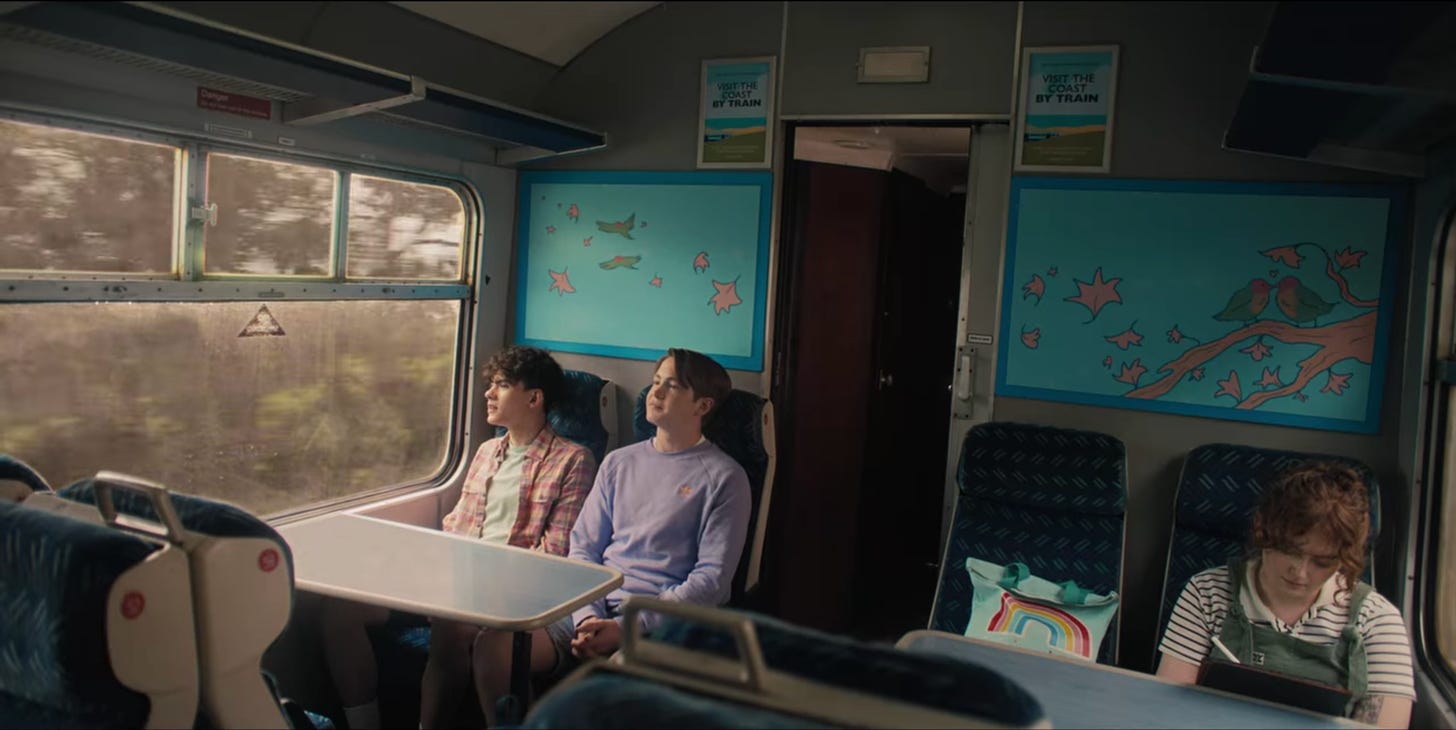
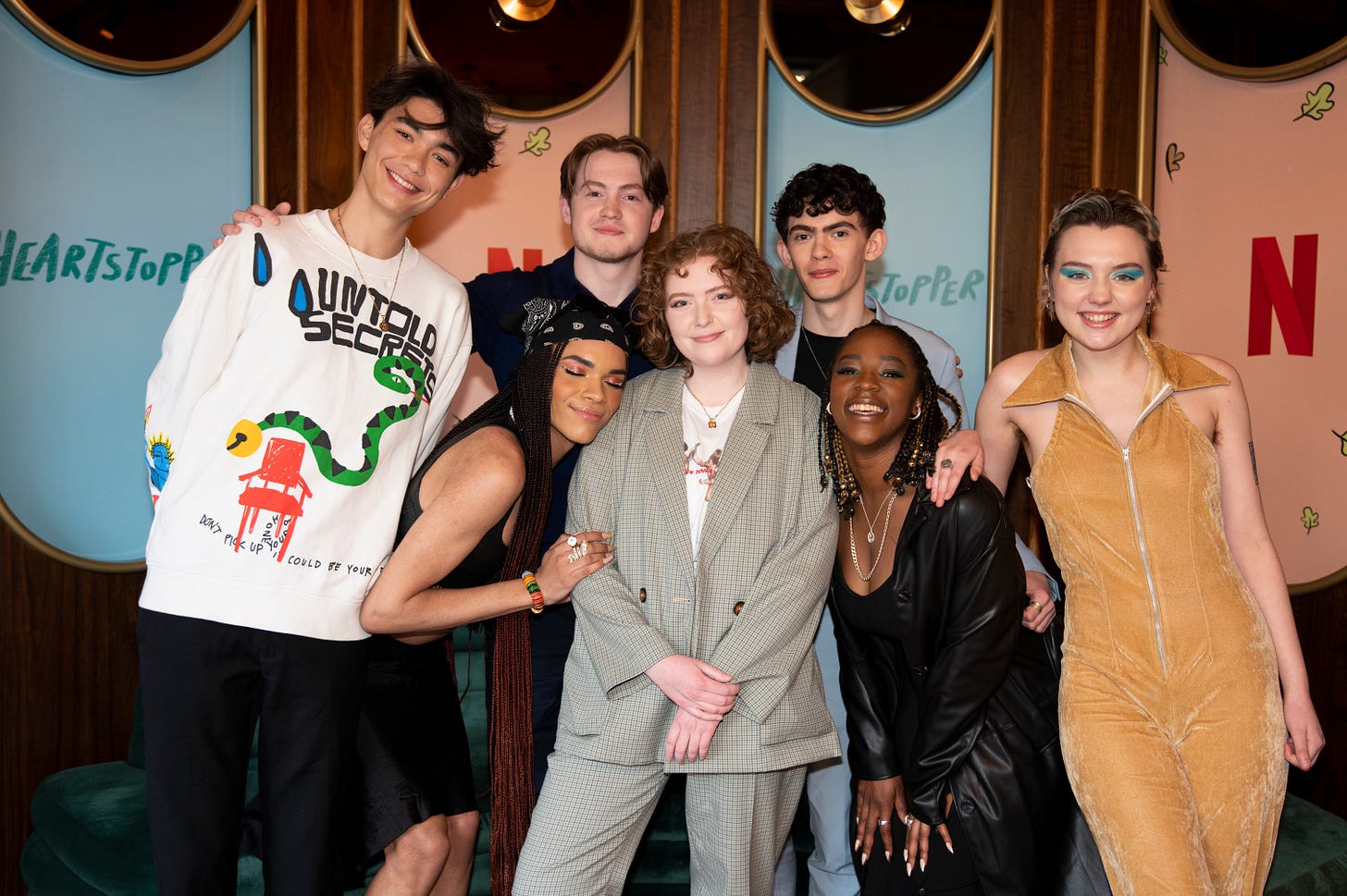
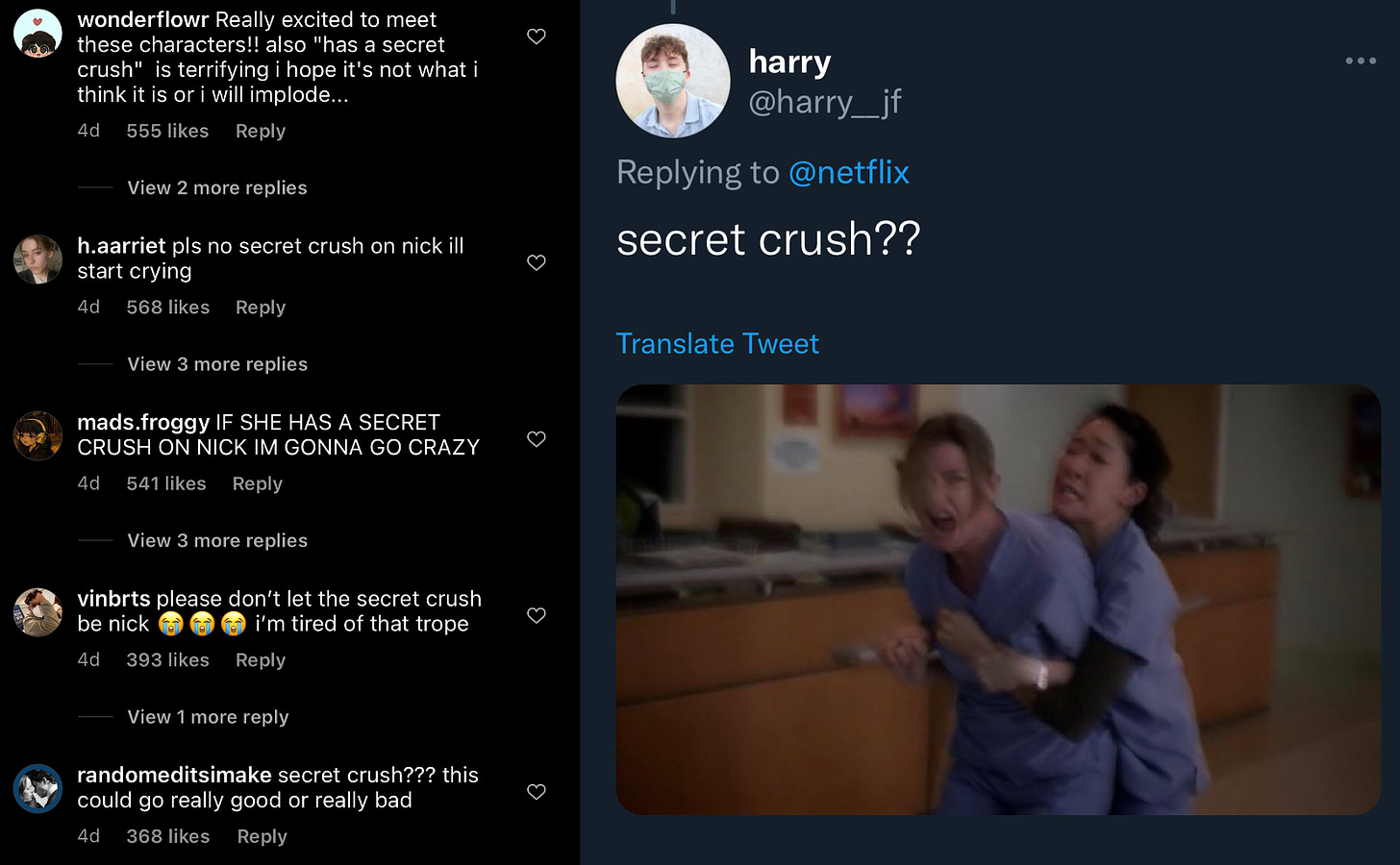

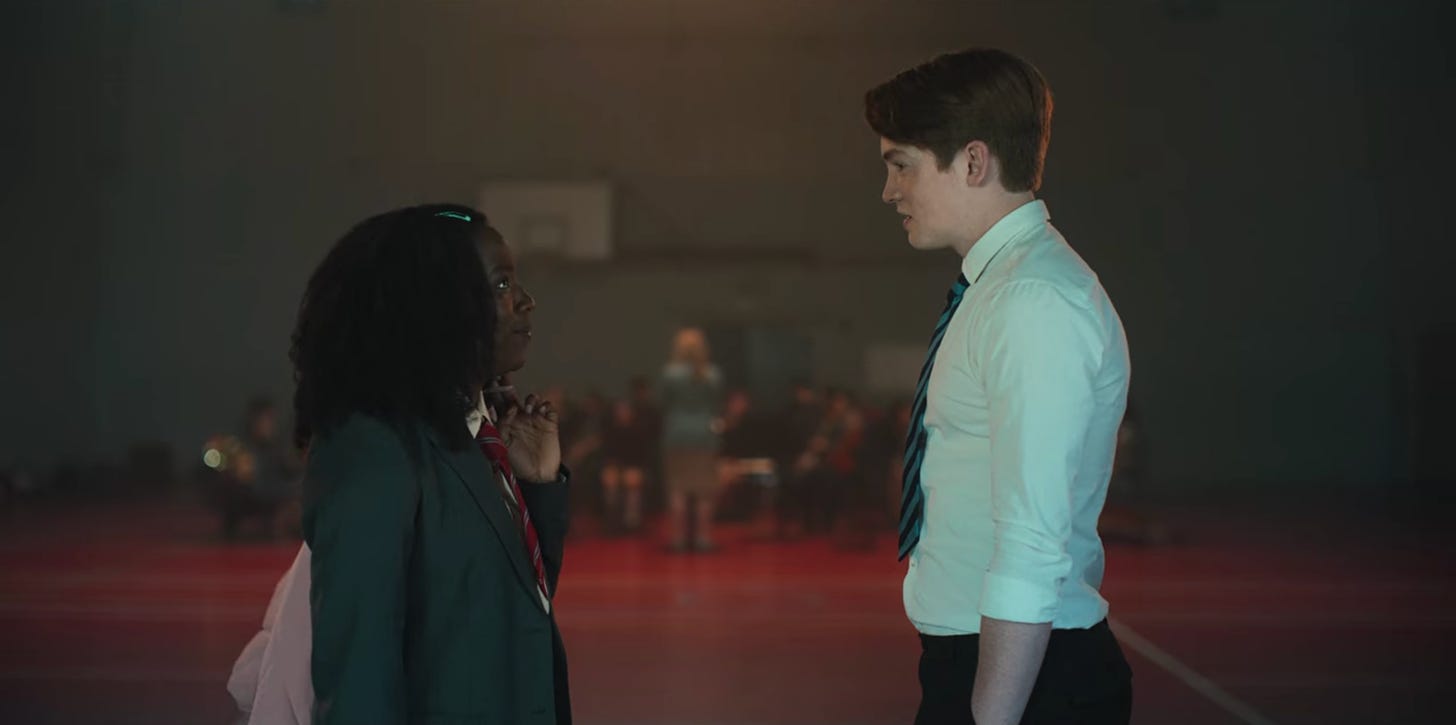
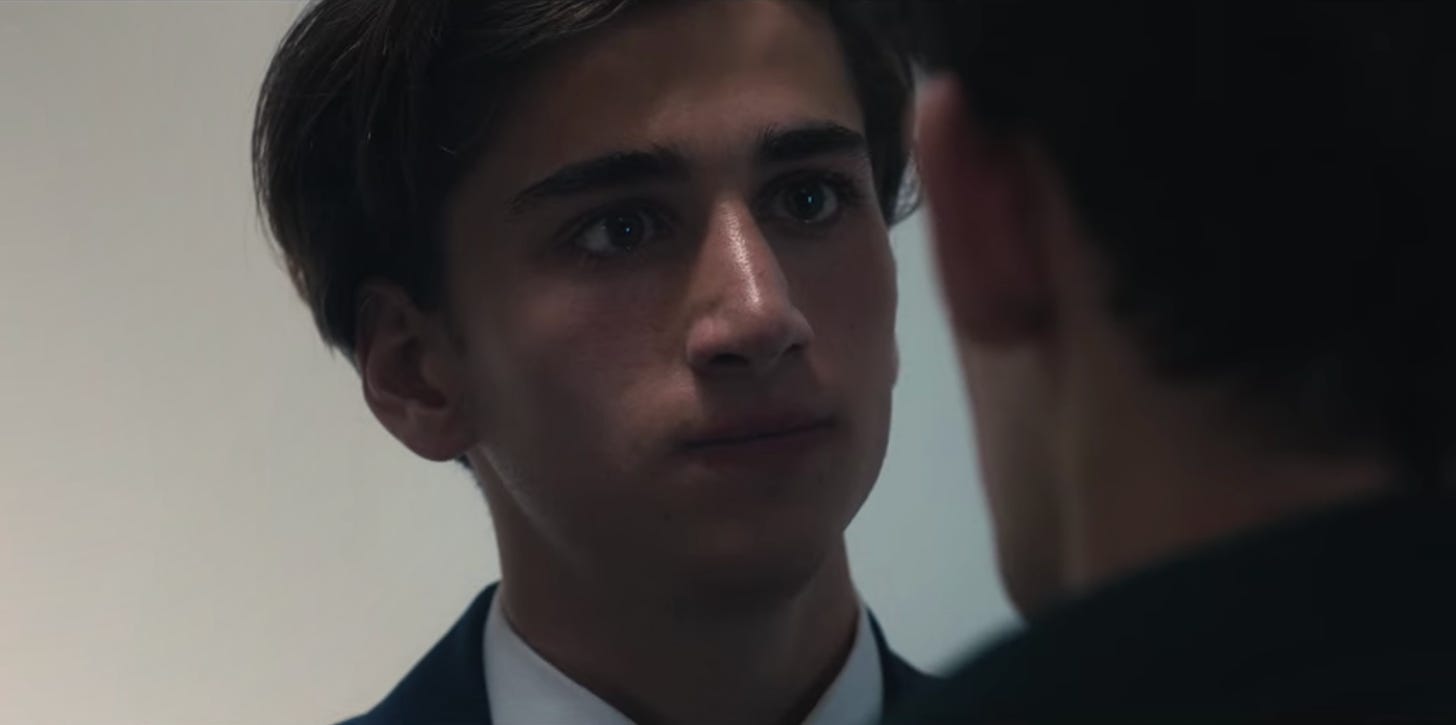
While I don't think there is anything wrong with the Pirates of the Caribbean scene, it doesn't really scream "Nick is bi" to me. At the time I read it as Nick was realizing that it was Bloom that he was into, not Knightley and that his mom's assessment of his 11 year old desires was just her assuming in a clueless mom way. But it works fine with Nick being bi too.
It's hard for me to imagine Ben as an unequivocal villain or simple foil. His whole deal seems to come from pain rather than cruelty.